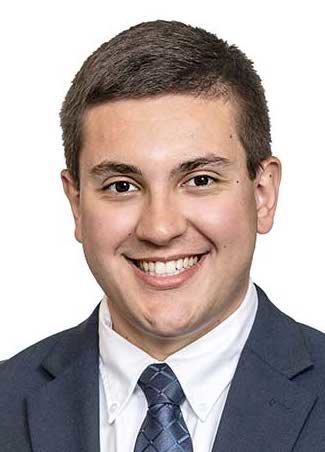Guilderland school board: Benjamin Goes
GUILDERLAND — Benjamin Goes says the best thing he’s ever done is volunteer with Guilderland High School’s E = mc2 program, helping students with individual projects. “It inspired me to be more involved with the schools and to find more ways to support students so I decided to run for school board,” he said.
Goes, 23, graduated from Guilderland High School in 2014, from the University at Albany with a bachelor of science degree in economics in 2016, and with a juris doctor degree from Albany Law School in 2018. He works as a commercial real estate attorney at Sciocchetti & Abbott.
His first three years on the board were not as productive as he would have liked. What he’s proudest of is having pushed an idea of visioning — not pushing a particular vision but encouraging conversation about needed change in education, which he believes is decades behind the times.
He says he’s been teased by some of his fellow board members for wanting to change the world and says he is interested in changing the schools. He says the board talks more now about visioning for the future.
Since the pandemic, Goes said, reviewing schooling is now part of the national conversation. We are now “at a watershed moment” for public education, Goes says, and it’s really not clear that it’s going to turn out well for the schools. Schools are obsolete if they teach just content, which is available from the phone in your pocket, he says.
He wants to focus on what schools can offer that the internet can’t, which is people and buildings, and to do away with artificial norms like grouping children by age.
Goes also asks, “Why do students graduate with essentially no real-world skills?” Public confidence in high school graduates is very low, he says.
Goes does not think that remote learning can replace what teachers do or they would have been replaced by YouTube long ago. The coronavirus crisis has demonstrated that schools offer more than content, he said, referencing the meals that the schools are now providing for families in need.
He also said that kids need the socialization provided by being together in schools.
“Teachers are the adults looking out for kids who come from households that aren’t what the school system assumes,” said Goes.
He believes the governor’s wondering about whether school buildings are needed is “very dangerous.” One thing that makes New York great is how much we prioritize our schools. We should be back in the building as soon as it’s safe to, because that is what’s best for kids, Goes said.
“School is a people business,” says Goes.
On finances, Goes thinks textbooks could be eliminated, saving hundreds of thousands of dollars. “They are the shallowest form of learning,” he said.
“I’m open to renegotiating contracts,” said Goes, “although I don’t think the unions will be.”
Goes said that only 2 percent of high school graduates feel they learned a foreign language well in school and that the teaching of foreign languages could be consolidated.
“If and when these cuts come,” he said, “they will be so big and so devastating, everything will have to be on the table.”
Goes believes the co-teaching model is very helpful. “Even kids not in special education benefit,” he said. If the money is available, he’d be in favor of expanding inclusion.
He suggests doing away with current boundaries, teaching students at different levels and letting students move around to the level that fits their skills.
Goes concluded by endorsing Luciano Alfonzi and Blanca Parker.
“One of my goals was not to be the youngest before I left,” Goes said, noting that Alfonzi is a year younger than he.
He called Parker “an outside-of-the-box thinker, “ and concluded, “I’m looking forward to working with them next year.”



